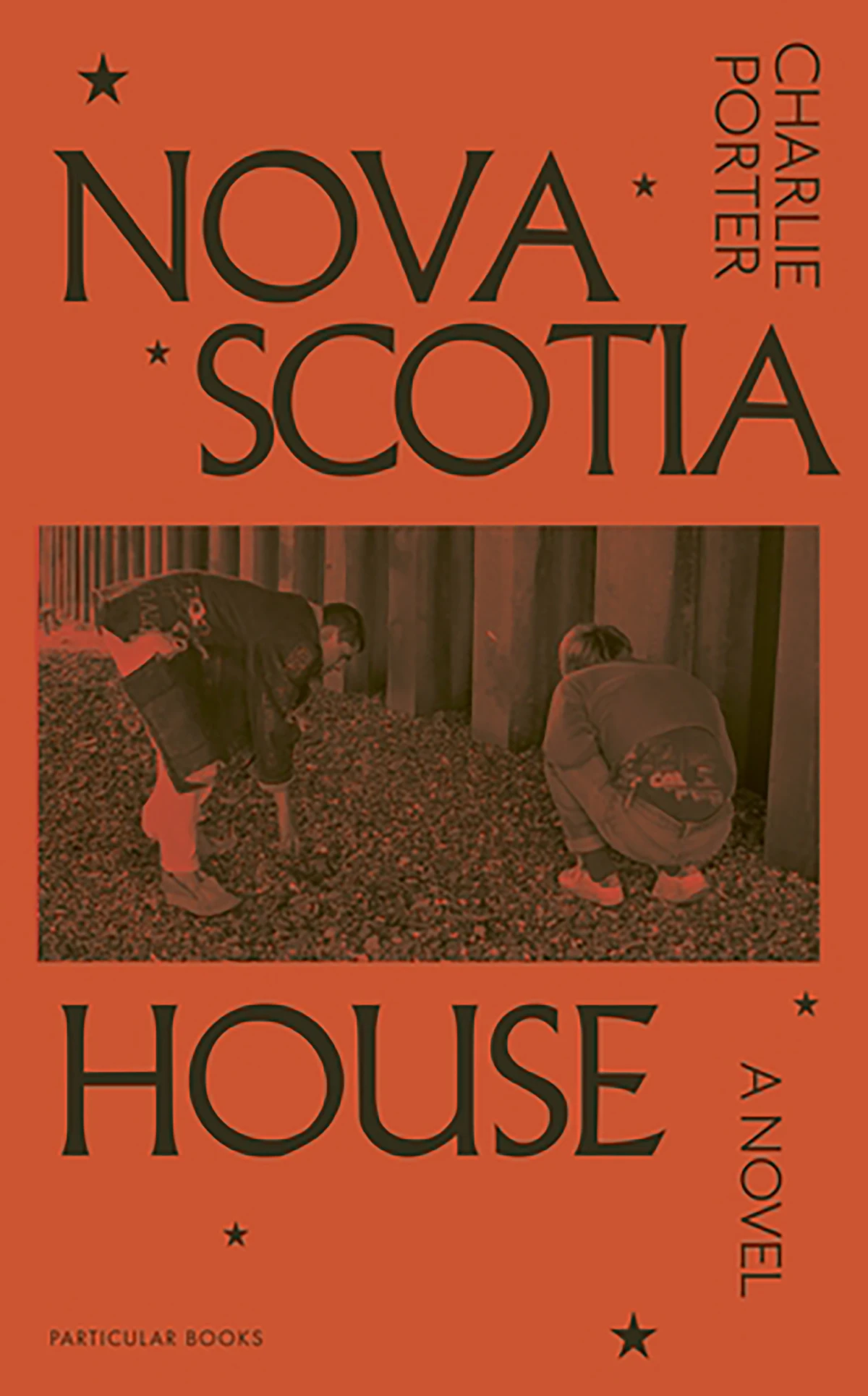
Charlie Porter’s Nova Scotia House: A Raw Portrait of Queer Survival
“A portrait of queer life in 1990s London, exploring the impacts of love and loss, while rejecting nostalgic narratives in favour of survival”. An interview with Charlie Porter on his debut novel Nova Scotia House
Charlie Porter’s Journey Beyond Fashion
Charlie Porter could have worked at any magazine or publication he wanted, something that most writers today would kill for. However, in 2018, while penning menswear reviews for The Financial Times, a gear shift felt imminent. “By the end of the time of I was doing it, I was unsurprised by what was happening at shows. You could have shown me anything, and I could write about it and to me that felt like a dangerous place to be in because it wasn’t challenging anymore. The thing about fashion is that it’s not like going to the theatre, it’s not open to the public. You’re entering a space rented by a business. I also knew at that point that I wanted to write books.”
And write books Porter did. In 2021, the style connoisseur released What Artists Wear through Penguin Books, an eye-opening journey through the wardrobes of art-world luminaries like Andy Warhol, Louise Bourgeois and Sarah Lucas. Its spiritual successor landed in 2023 in the form of Bring No Clothes, a study on the fashion philosophy of Britain’s Bloomsbury set. Think Virginia Woolf, E.M. Forster and John Maynard Keynes to name a few. At the heart of what makes his voice in fashion just so esteemed is its unwavering transparency, inviting us to reimagine how we consume clothes and why our sartorial choices should be connected more to culture than commerce. It’s something Porter feels strongly about as the luxury sector grows increasingly fragmented and, indeed, soulless.
“What’s happening right now is the most naked business machinations. All that’s happening now is business. So these changes of designers, this pause season at so many houses or this one house that’s clearly about to sack their designer, you know, this, strange period, it’s the machinations of billion dollar conglomerates.” And that is perhaps why Porter’s latest work steps so decisively beyond the world of fashion.
“You could have shown me anything, and I could write about it and to me that felt like a dangerous place to be in because it wasn’t challenging anymore. The thing about fashion is that it’s not like going to the theatre, it’s not open to the public. You’re entering a space rented by a business. I also knew at that point that I definitely wanted to write books.”
Nova Scotia House, a novel by Charlie Porter: The Fragile Architecture of Survival
This March sees the arrival of Porter’s debut novel, Nova Scotia House, published by Particular Books. Those who step into this melancholic, dystopian world of Porter’s will be taken aback by how much of a portal the novel is into the radical, fragile and defiantly tender Queer vision of London between the 1990s and the present day. Stripping away nostalgia and developing a modernist sensibility that is often challenging, Porter paints a raw, deeply felt portrait of Johnny, 19, and Jerry, 45, navigating love and loss against the looming spectre of the AIDS Crisis. Porter taps into the very real systemic oppression facing the Queer community at this time, and rampant homophobia spurred by Section 28, and the ways in which they fought back.
“The novel explores, queer experiments in living, and alternative ways of being. Johnny, now 48, reflects on his relationship in the early ’90s with Jerry, 25 years his senior, whose youth was shaped by the ’60s and ’70s. Through that relationship, Johnny seeks inspiration to rebuild lost ways of living. He’s stuck in a flat he has no legal right to – Jerry’s sister pretends to live there so Johnny can stay, due to past housing laws that didn’t recognise gay couples.”
The novel veers deftly in and out of its disparate time periods, tracing the lasting impact of Jerry’s absence on Johnny’s present-day life, in a dystopian yet visceral vision of London without culture, life or hope. Through fragmented memories and present-tense urgency, Porter explores how grief, housing insecurity and the erasure of queer lives intersect. Nova Scotia House is less concerned with resolution than with the act of holding on-capturing the everyday negotiations of a man trying to rebuild meaning, home and identity in the long shadow of a relationship shaped by both love and structural injustice.

“It’s well documented-especially in Sarah Schulman’s The Gentrification of the Mind – that the AIDS crisis devastated counterculture by destroying communities and ecosystems, creating a vacuum later filled by gentrification. I wanted to explore this in fiction, specifically in London. Around the time antiretrovirals were introduced, the “Pink Pound” emerged – gay men were increasingly targeted as consumers, with assumptions of frivolity and materialism. Through characters like Johnny, I wanted to examine lives that existed outside that narrative, shaped more by loss and survival than consumption.” In doing so, Porter’s breathtaking novel resists the sanitised narratives of Queer progress, instead reclaiming space for the messier, unresolved realities of grief, resistance and the quiet labour of survival.
Survival is indeed a concern of the novel, and living inside the scrambling mind of Johnny is a challenging experience at times. Porter’s novel arrived amidst a wave of post-modernism or even post-post-modernism, like Johnathan Buckley’s Tell or Anne de Marcken’s It Lasts Forever and Then It’s Over. These works tap into the struggles of navigating personal identity and its self-reflexivity, in a social and political landscape that is fraying and fails to clearly define itself. However, Porter’s novel stands out for being rooted in the central tenets of modernist figures like Virginia Woolf or E.M. Forster -its commitment to form, its emotional urgency, and its faith in the written word as a vehicle for truth. Rather than turning away from meaning, Nova Scotia House reaches toward it, however fractured or fragile that pursuit may be.
“The novel explores, queer experiments in living, and alternative ways of being. Johnny, now 48, reflects on his relationship in the early ’90s with Jerry, 25 years his senior, whose youth was shaped by the ’60s and ’70s. Through that relationship, Johnny seeks inspiration to rebuild lost ways of living.”
The Power of Community and Building Anew in In Nova Scotia House
In Nova Scotia House, the idea of community is not idealised or nostalgic, but examined through the lens of loss, change, and the realities of daily survival. Johnny is not a glamorous figure; he works as a receptionist at a GP surgery. Jerry, his older partner from the 1990s, was a community worker. These are not the one-note caricatures so often projected by Queer media. Instead, they are rooted in everyday, local life-an existence that reflects working-class realities and a different kind of queer experience. “They’re not, ‘let’s go to Mykonos for three weeks,’ you know? It’s a very different way of being I wanted to bring to light.”
Porter deliberately counters dominant portrayals of queer life that lean toward wealth, gloss, and consumerism. Johnny and Jerry’s lives are about small acts, about local connection, and about surviving with dignity. This isn’t a story of big gestures or shiny aesthetics; it’s about how people build and sustain community when the traditional systems of support have failed them. In highlighting characters whose queerness is defined as much by care and interdependence as it is by desire, Porter sketches a different vision of collective life.
The novel does not yearn for a return to the past. Porter is explicit in rejecting nostalgia as a solution. “The book for sure is not being like, ‘Hey, we can do exactly the same as was done then.'” London of the 1970s and ‘80s was, in many ways, still a post-war city-there were spaces available for squatters, for collective living, for countercultural experimentation. That version of the city is gone, and Porter doesn’t pretend it can or should come back. “It would be naive and also kind of wrong to suggest that. Right now, that’s not a possibility.”
What he does suggest, however, is that the values embedded in those earlier experiments-mutual care, creativity, and local connection-can be reimagined in the present. This happens in small ways: through volunteering, through organising, through simply showing up. Porter recounts how his own life was changed by joining a local gardening group at Arnold Circus in 2019. “I’m one of the gardeners on a Friday, and anyone can come join us. I started doing it in 2019, and it fundamentally changed my life.” Volunteering became a central practice that shaped not only his worldview but the very act of writing Nova Scotia House. “The volunteering is in the way I then wrote all of these three books.”

It’s not only about helping others; it’s about experiencing connection, purpose, and interdependence, an ethic of community that deeply contrasts the hyper-individualism of contemporary life.
Porter’s vision of community also includes joy. He talks about nightlife not as a commercial industry, but as something that can be reclaimed and remade. “It can be about getting together with some friends and putting on a party, in just like a super regular bar where there’s nothing else going on, on a Tuesday.” A party on a quiet night becomes an act of creation. It’s about rethinking pleasure as a form of resistance, about reclaiming space and time together without relying on corporate structures. Community, in Porter’s world, is built through repetition, intention, and shared effort, through acts that may seem small but are, in fact, deeply political.
In many ways, Porter’s novel offers Gen Z and millennial readers a language for something they already feel: the desire for belonging in an increasingly fragmented world. As younger generations report fewer friendships and increasing loneliness, Nova Scotia House doesn’t offer solutions so much as it offers a possibility, a quiet but persistent suggestion that connection is still possible, but it must be made, tended, and remade, often in the margins.
Community, then, becomes a form of queer resistance, not just in defiance of the systems that failed them, but as a refusal to disappear. By building spaces of care, organising around joy, and honouring interdependence, Nova Scotia House doesn’t simply reflect a past form of queer life; it actively calls for a renewed commitment to communal living in the present.
“(Johnny and Jerry) are not, ‘let’s go to Mykonos for three weeks,’ you know? It’s a very different way of being I wanted to bring to light.”
What’s Next? Charlie Porter’s trajectory has been anything but predictable
Porter worked on Nova Scotia House for a number of years before he worked up to the courage to submit it to his editor. Now that the book is out in the world, and receiving rapturous reviews from the likes of Hilton Als and Olivia Laing, the question now is what’s next? Porter is, understandably, reticent to reveal the next chapter – “I’m not telling you!” – but fans of Nova Scotia House and his fashion history duology will be happy in equal measure.
“It’s all the same projects happening at the same time—I’m already 20,000 words into a new novel and hoping to start a new nonfiction next month. That layering is important to my writing, with more than one thing always happening beneath the surface. Now that my fiction is being published, it’s just more visible—I’m less hidden. I always see the nonfiction and fiction as working in tandem, like steps across different points.”
Charlie Porter’s trajectory has been anything but predictable – intense, layered, and always reaching for new forms. Whatever comes next, it’s certain he’ll surprise us once more, with the same quiet force that makes his work linger long after the final page.
Charlie Porter
Charlie Porter’s love for the written word took root early, and during his teenage years, it became clear after a 70-word piece he had written was featured in the Peterborough Evening Telegraph. From there, the trajectory of the then-budding writer only soared. Beginning as an Arts writer for The Times and later Esquire, Porter earned some of the industry’s most coveted positions; Deputy Fashion Editor at The Guardian, Deputy Editor of menswear bible Fantastic Man and until 2018 Menswear Critic at the Financial Times. Porter’s clear and decisive writing style made him a trusted authority, and in 2003 earned holds the rare badge of honour of being banned from a show for actually writing something honest about it.
Ciarán Howley








